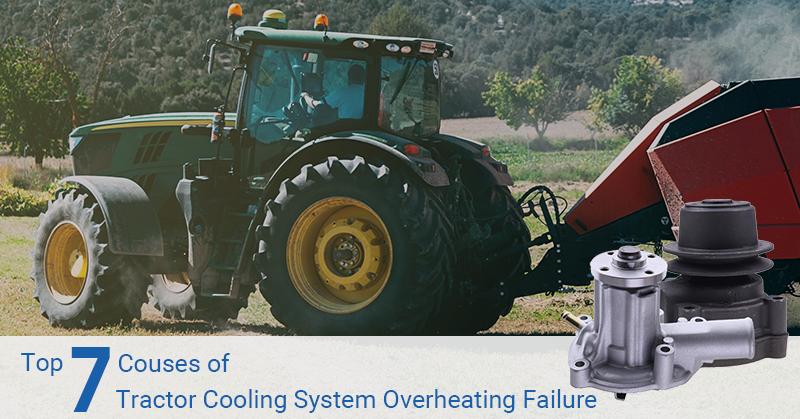Experiencing the hottest summer in history? How are you and your tractor? With summer on its way, temperatures are rising – and the risk of your tractor overheating is on an upward trend as well. After all, if your tractor is baking in the sun at 90 to 100 degrees and the engine hasn’t even been turned on, you’re working at a significant disadvantage. There are also plenty of factors outside of the external temperature, however, that can contribute to your tractor’s risk of overheating, and most of them are preventable if you know what to look for.
Farm machinery is essential for tasks such as land preparation, planting, and harvesting. However, like any complex machinery, tractors can encounter issues, with overheating of the cooling system being a common and serious problem.
However, improper maintenance and usage can lead to overheating issues. Operators and owners must understand the causes of overheating to prevent these problems. If you want to learn more about how to avoid overheating in farm machinery, keep reading!

Tractor Cooling System
Well, tractor engines are typically cooled in one of two ways: air cooling or liquid cooling.
In air-cooled systems, a large blower directs cool air to overheat dissipation fins, targeting the hottest parts of the engine to keep temperatures in check.
Modern tractors, on the other hand, usually feature liquid cooling systems. These systems are more complex and include components like a thermostat valve, radiator, water pump, water jackets, fan, belt, and pulley.
This intricate dance of components ensures that your tractor stays cool and runs efficiently, even under heavy workloads.
What can Cause Tractor Cooling System Overheating Failures?
1. Coolant Shortages or Blockages
Low coolant is another sneaky culprit behind overheating. Coolant is crucial for keeping your engine cool, so always check the level before firing up your tractor.
If you find the coolant is low, let the engine cool down completely first. Then, pop off the radiator cap and top up with the same type of coolant—using the wrong kind can actually make overheating worse.
Also, make sure the coolant hose is clear and free from blockages, as even new coolant won’t help if the hose is clogged. And don’t forget to check the water pump; it should be in good shape to keep the coolant circulating smoothly.
2. Malfunctioning Thermometer
The temperature gauge on your tractor’s dashboard is like its health monitor, keeping you informed about the engine’s temperature. Once it malfunctions, you’re essentially flying blind, unaware that your engine might be on the verge of overheating.
A simple trick to test it if you suspect your temperature gauge: remove the gauge and dunk it in a pot of boiling water. If the gauge needle doesn’t budge, it’s time for a replacement. This quick test can save you from major headaches down the road!
3. Radiator Blockages
The engine radiator is a vital player in your farm machinery, working hard to whisk away excessive heat from the engine. It cools the circulating coolant, keeping everything running smoothly. But beware—a dirty radiator can turn your tractor into a ticking time bomb for overheating.
Imagine this: the cooling fins are clogged with dirt, choking off the airflow needed to cool the coolant. This can lead to a rapid rise in engine temperature.
To keep your tractor in tip-top shape, make sure the radiator stays clean and free from dirt. A clean radiator ensures proper airflow, helping your tractor stay cool under pressure.
4. Faulty Water Pump
The water pump keeps coolant flowing through the engine and radiator. If it’s not working right, this flow stops, and overheating can quickly follow. Watch out for coolant leaks or strange noises around the pump—these are red flags that it’s time for a replacement. Fixing a faulty water pump promptly is key to keeping your engine cool and running smoothly.
5. Fan Malfunction
6. Overloading
Overloading farm machinery can push the engine beyond its limits, causing it to overheat. Always adhere to the machine’s capacity to avoid excessive strain and elevated temperatures. If you frequently find yourself pushing the limits, consider upgrading your equipment to handle heavier loads more efficiently.
7. Old and Dirty Filters
Last but not least, a very important but often overlooked point is the regular cleaning of the filter. Regularly check your air filter to ensure it’s free from dirt and debris. A clogged filter can lead to engine overheating. Make sure to clear away any dust and particles both on and beneath the filter to keep your engine running cool.
Conclusion
To prevent your tractor from overheating and disrupting your project, it is wise to opt for regular maintenance. According to the reasons mentioned in the article, you can keep the tractor in optimal condition even during the scorching summer by inspecting, cleaning, or replacing tractor parts regularly.
Regular maintenance not only prevents overheating but also mitigates other mechanical issues. If you have any other parts that need replacement, please check our tractor parts catalog. Our parts are reasonably priced and adhere to OEM standards, with fast shipping. Additionally, we have an anniversary sale event in August, so prepare your parts list in advance to use the FridayParts discounts saving you money.
Related Post: Tips for Preventing Tractor Radiator Overheating
